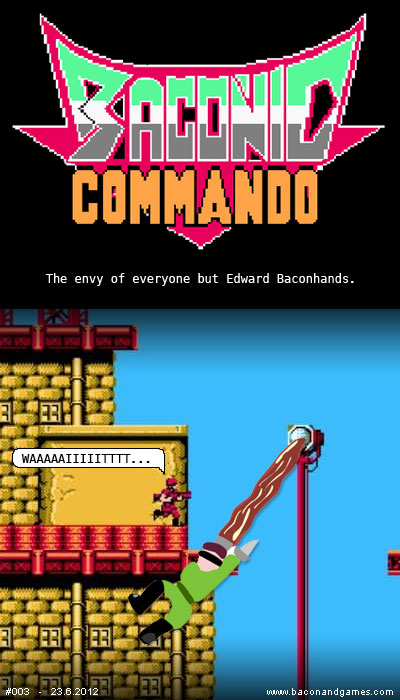Triple Town is not a match-3 game. It’s a game in which you match 3 objects. Confused? Let me splain… No, there is too much. Let me sum up.
Yesterday I tweeted the following:
Dear App reviewers, please stop referring to #tripletown as being part of the match-3 genre. Is GTA a racing game because it has cars?
— Sean James McKenzie (@baconandgames) March 26, 2012
Shortly thereafter, @Spryfox favorited the tweet and a fun little discussion between myself, Dan Cook (@danctheduck) and a few app reviewers ensued. It was all healthy discussion, nothing mean spirited, but it got me thinking about my position and I wanted to take the opportunity to get it out in more than 140 characters. So as promised, let me sum up.
Actually this could take a while, I’m gonna splain.
Most Triple Town articles label it as a match-3 game, a genre started and dominated by Bejeweled. As a word-for-word English translation, Triple Town is a match-3 game because in it you match 3. I get that. And to be fair, most of the reviewers go on to say that Triple Town “turns the match-3 genre on its head”. Clearly they appreciate how dissimilar Triple Town is from the Bejeweleds of the world. But from a purely academic standpoint, I’d like to question whether it is even part of the match-3 genre at all.
A Few Analogies, Because I Likes Me Some Analogies
When you label something with a specific genre you have to accept the responsibility of all the extra stuff that comes along with that tag. If I describe a movie as romantic and comedic, you might just think it’s going to be a love story with some funny actors in it which, I’ll admit, isn’t far off from what a RomCom is. But calling something a RomCom says far more than “oh, well it’s a story about love with some funny parts”.
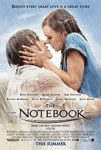 The term RomCom immediately conjures images of Hugh Grant and Katherine Heigl, of the supportive sounding-board best friend, of the last minute airport embrace and chance encounters, of You’ve Got Mail and The Notebook and causes most mens’ eyes to roll back before they begrudgingly attend the film and pocket their guilt-free-poker-night-with-the-boys-credit. Any movie that induces the former is a RomCom, movies that have romance and jokes many not be deserving of the label. Or for you math majors out there, all squares are rectangles but not all rectangles are squares.
The term RomCom immediately conjures images of Hugh Grant and Katherine Heigl, of the supportive sounding-board best friend, of the last minute airport embrace and chance encounters, of You’ve Got Mail and The Notebook and causes most mens’ eyes to roll back before they begrudgingly attend the film and pocket their guilt-free-poker-night-with-the-boys-credit. Any movie that induces the former is a RomCom, movies that have romance and jokes many not be deserving of the label. Or for you math majors out there, all squares are rectangles but not all rectangles are squares.
Does Triple Town borrow from the match-3 genre? Absolutely, but not in the way most of that genre do. Most match-3 games take the Bejeweled gameplay and then add something, but the core swap-to-match element remains the same.
- “It’s like Bejeweled, but with differently shaped boards.”
- “It’s like Bejeweled, but you have to clear every space.”
- “It’s like Bejeweled, but you can rotate the board.”
Dan described it this way:
@troygilbert @baconandgames Poker also has that matching mechanic. ;-) ‘match-3’ have historically used ‘swap adjacent tiles to match 3’
— Daniel Cook (@danctheduck) March 26, 2012
SpryFox took the match-3 action, distilled it down and when they built it back up they were left with something miles away from where they started. It’s sorta like taking apart a lawn mower and using some of the pieces to build a dirt bike. Sure it’s still got some gears from the lawnmower, but a lawn mower and a dirt bike are two very different machines. And you certainly wouldn’t point your long-lawned neighbor in the direction of a dirt bike just because it once had lawnmower parts.
Above, I purposely used the word action instead of mechanic. I think that Bejeweled and Triple Town share the action of matching 3 or more objects. On the surface those actions are the same, but the mechanic or the core gameplay element, the reason for and the path to a match are as different as night and day.
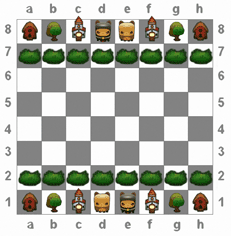 To make a single move in Triple Town you have to think many moves ahead, much like deploying your pieces in chess. You make your move based on where you want the pieces to eventually be rather than where you’re about to put them. Making one move in Bejeweled only requires that you locate an existing match on the board in front of you. From that perspective, Bejeweled has more in common with a word search than it does with Triple Town and I don’t think anyone would mistakenly categorize a word search along side of chess.
To make a single move in Triple Town you have to think many moves ahead, much like deploying your pieces in chess. You make your move based on where you want the pieces to eventually be rather than where you’re about to put them. Making one move in Bejeweled only requires that you locate an existing match on the board in front of you. From that perspective, Bejeweled has more in common with a word search than it does with Triple Town and I don’t think anyone would mistakenly categorize a word search along side of chess.
Bejeweled, while fun, is generally a mindless frantic hunt and peck. Triple Town is a slow, thought out game of strategy. My mother (a target casual 60 year old gamer) will play Bejeweled or a do a word search, she would never play chess or Triple Town.
Moreover, you can’t accidentally make a floating castle in Triple Town any more than you can plan a 15 chain combo in Bejeweled. You really have to earn your advanced town (i.e. your high score) in Triple Town. But in Bejeweled the biggest scores come from serendipitous chains of gems falling luckily into matches. There’s certainly skill involved in training your brain to quickly scan for matches, but outside of that the scores are largely dependent upon luck. It might be fair to say that the two games have inversely proportionate luck:strategy ratios.
I’d like to pause here to say that I’m not picking on Bejeweled or the people who play it. I think Bejeweled is a well tuned, fun game that has masterfully captured the attentions and wallets of millions of people. I just don’t think Triple Town has as much in common with it as so many reviewers suggest.
Am I Being Semantically Petty?
In truth, we’re at a point with gaming where people are rapidly consuming and discarding games. People have gotten used to trying stuff out and moving on if it’s not for them. Games are affordable and accessible these days and the app store has given even the unlikeliest of gamers circa 5 years ago an unexpected thirst for games today. So I don’t think that in practice calling Triple Town a match-3 game is by any means devastatingly damning, but for the sake of discussion a few points…
First, I think it’s safe to say that there are many people out there who scoff at the casual, match-3 genre. I’m not saying they’re right, but it does carry a stigma. It’s often written off by more “serious” gamers along with Farmville and its largely 60 year old female fanbase. I’ve worked with many clients over the last 5 years who specifically go after that genre because they want that crowd and many who avoid it like the plague. While I think Triple Town has done well enough that it probably doesn’t matter how you categorize it, calling it a match-3 game is a little too easy. And in some sense it’s doing Triple Town a bit of a disservice by shouldering it with all that “RomCom baggage”.
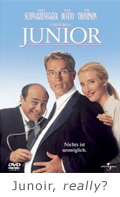 Second, as a reviewer one of the things you’re hoping to do is guide people from games they like to games they might like as a result. You’re the flesh and bones Pandora for games, and I’m not sold on the idea that people who like to match 3 things in Bejeweled will enjoy matching 3 things in Triple Town. They might, but probably not because they just happen to like the action of matching 3 things regardless of the how, when and why of it. I enjoy both Kindergarten Cop and Terminator and would recommend both movies. I would not recommend both movies to any two groups of people just because of Arnold. What he brings to one he does not deliver in the other. If that’s the only common thread of interest my recommendation is going to fall flat. Same actor, VERY different role. Same action, VERY different role.
Second, as a reviewer one of the things you’re hoping to do is guide people from games they like to games they might like as a result. You’re the flesh and bones Pandora for games, and I’m not sold on the idea that people who like to match 3 things in Bejeweled will enjoy matching 3 things in Triple Town. They might, but probably not because they just happen to like the action of matching 3 things regardless of the how, when and why of it. I enjoy both Kindergarten Cop and Terminator and would recommend both movies. I would not recommend both movies to any two groups of people just because of Arnold. What he brings to one he does not deliver in the other. If that’s the only common thread of interest my recommendation is going to fall flat. Same actor, VERY different role. Same action, VERY different role.
So What IS Triple Town?
I think it’s a strategy-puzzle game, which is lightyears away from what people think of when they hear match-3. The pacing of Triple Town is completely different than Bejeweled games. The process for arriving at a match is completely different. The impacts of choice and luck are completely different. They share the action of matching 3, but as a thread of similarity the association between the two is extremely weak.
Although it’s a digital game, Triple Town has more in common with brick and mortar board games like The Settlers of Catan than it does with its so-called digital match-3 brothers and sisters. And the people who enjoy frantically dropping down gems in Bejeweled may very well not appreciate the calculated and challenging puzzle of building up a Triple Town.
To the point that people are accustomed to consuming apps like so many chips and dip during the Super Bowl, Triple Town could certainly suffer a worse fate than having the enormous match-3 crowd take a look, even if it’s for the wrong reasons. No harm no foul I guess. But in the spirit of appreciating Triple Town for what it really is, I wish that more reviewers would describe in plain English that Tiple Town involves some matching, rather than simply branding the “match-3 genre” into its hide.
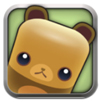 However you slice it, Triple Town is an enormously fun game that you should try (it’s free). And if you haven’t already played Bejeweled, well… I’m really not sure how you made it this far into my article. Either way, thanks for reading!
However you slice it, Triple Town is an enormously fun game that you should try (it’s free). And if you haven’t already played Bejeweled, well… I’m really not sure how you made it this far into my article. Either way, thanks for reading!
In the interest of leaving you on a less serious note, I think maybe @victordecarv put it best:
@baconandgames technically is a kill-murder-rob-rape-while-racing game
— Victor Carvalho (@victordecarv) March 26, 2012
Touche.
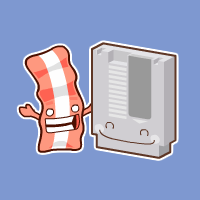
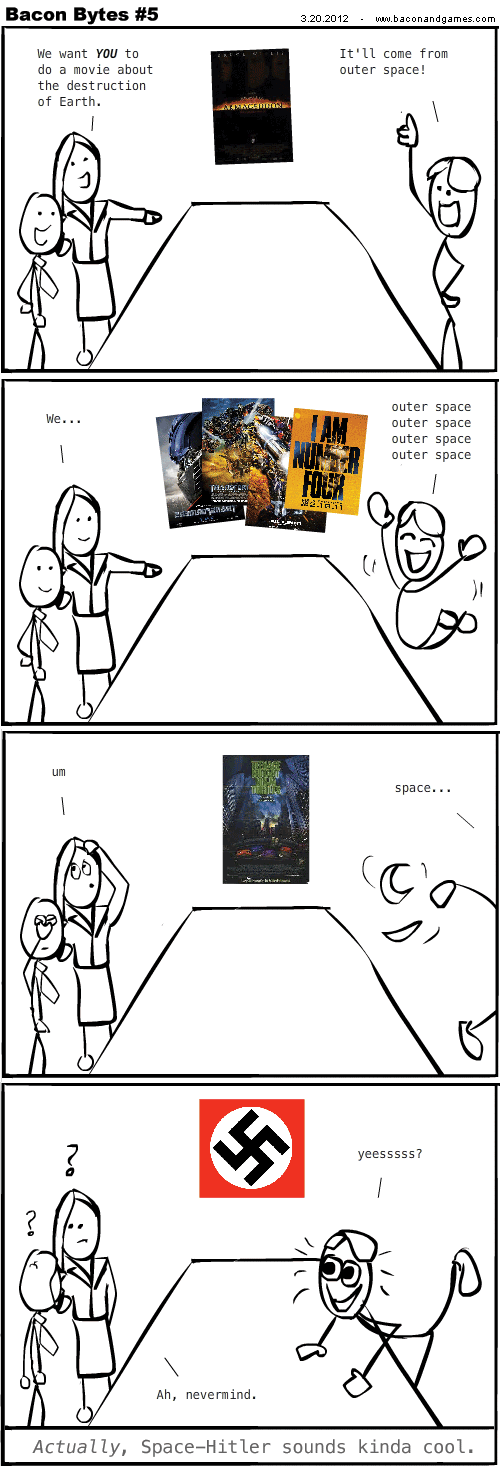
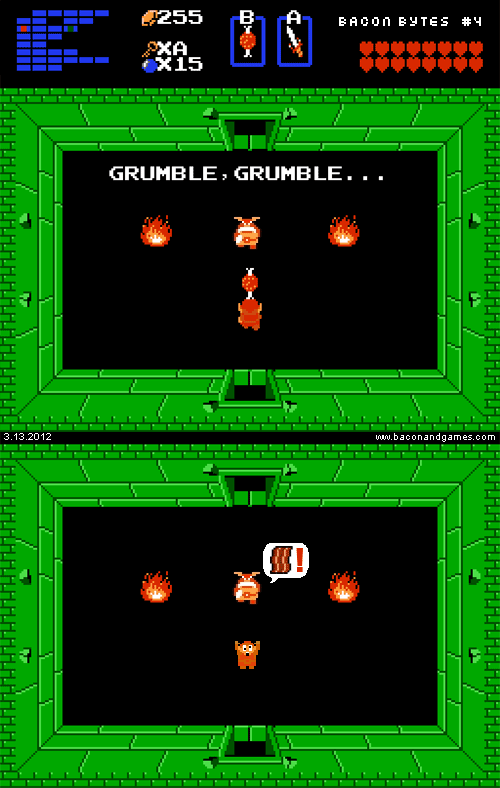
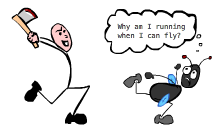 Sometimes when you’re chasing down a bug, the quick and dirty ‘caveman debugging’ approach is easier than using an actual debugger with breakpoints and ‘all that happiness’ (as my father says). The trace() function is great for this, but if want to view flash traces in a web-browser you have to deal with the debug player and Flash-tracer setup. And if you want to get input from someone who doesn’t have those tools you’re out of luck.
Sometimes when you’re chasing down a bug, the quick and dirty ‘caveman debugging’ approach is easier than using an actual debugger with breakpoints and ‘all that happiness’ (as my father says). The trace() function is great for this, but if want to view flash traces in a web-browser you have to deal with the debug player and Flash-tracer setup. And if you want to get input from someone who doesn’t have those tools you’re out of luck.